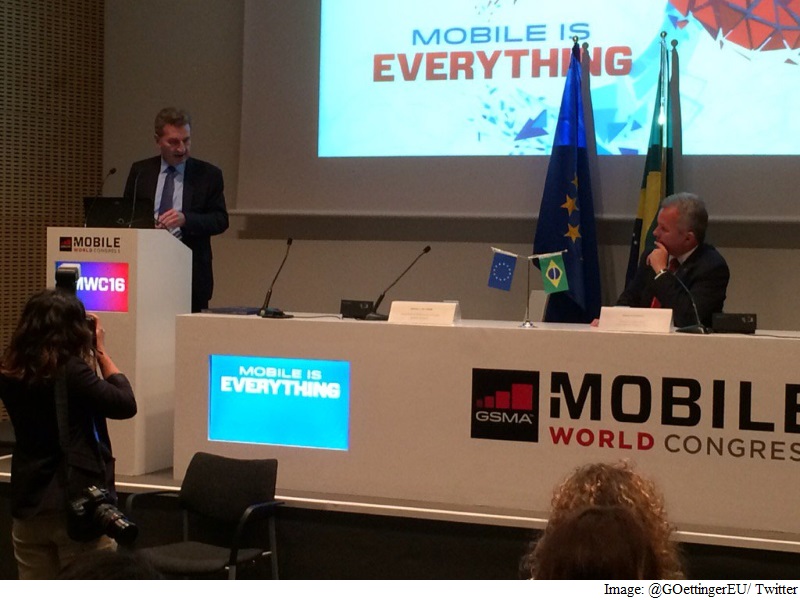- Home
- Telecom
- Telecom News
- EU, Brazil Agree to Cooperate on Ultra Fast 5G Networks
EU, Brazil Agree to Cooperate on Ultra-Fast 5G Networks

The agreement signed in Barcelona by EU Digital Commissioner Guenther Oettinger and Brazilian Communications Minister Andre Figueiredo sets out goals on common 5G standards and research as well as timeframes for introducing the new technology.
"Neither Europe, nor Brazil can afford to lag behind in the digital era. With today's agreement we have notably committed to cooperating on the take-up of 5G in so-called vertical industries such as transport or energy," Oettinger said in a statement after the signing at the Mobile World Congress, the world's biggest mobile fair.
In a joint statement, Brazil and the European Commission said communications infrastructure was "the backbone of the future digital economy and society, creating more and better jobs, and contributing to a sustainable economic growth" in both the Brazilian and EU economies.
Lightning fast 5G networks are seen as central to the development of the Internet of Things, a growing array of intelligent web-enabled objects used in everyday life.
By delivering data at much faster speeds 5G networks could enable services such as driverless cars and remote surgery - whereby a surgeon performs an operation remotely with the aid of a robot - and allow customers to experience video and virtual reality with greater ease.
The International Telecommunication Union, a UN agency which works on interconnection among global carriers, said its member countries had approved a plan detailing how to harmonise standards for 5G, with the rollout expected for 2020.
Besides Brazil, the EU has also signed agreements on 5G cooperation with China, Japan and South Korea.
For the latest tech news and reviews, follow Gadgets 360 on X, Facebook, WhatsApp, Threads and Google News. For the latest videos on gadgets and tech, subscribe to our YouTube channel. If you want to know everything about top influencers, follow our in-house Who'sThat360 on Instagram and YouTube.
Related Stories
- Samsung Galaxy Unpacked 2025
- ChatGPT
- Redmi Note 14 Pro+
- iPhone 16
- Apple Vision Pro
- Oneplus 12
- OnePlus Nord CE 3 Lite 5G
- iPhone 13
- Xiaomi 14 Pro
- Oppo Find N3
- Tecno Spark Go (2023)
- Realme V30
- Best Phones Under 25000
- Samsung Galaxy S24 Series
- Cryptocurrency
- iQoo 12
- Samsung Galaxy S24 Ultra
- Giottus
- Samsung Galaxy Z Flip 5
- Apple 'Scary Fast'
- Housefull 5
- GoPro Hero 12 Black Review
- Invincible Season 2
- JioGlass
- HD Ready TV
- Laptop Under 50000
- Smartwatch Under 10000
- Latest Mobile Phones
- Compare Phones
- Redmi Turbo 4
- Vivo Y200+
- Lava Yuva 2 5G
- OnePlus Ace 5
- OnePlus Ace 5 Pro
- Oppo A5 Pro 5G
- Vivo Y29 5G
- Honor Magic 7 RSR Porsche Design
- Asus Zenbook S 14
- MacBook Pro 16-inch (M4 Max, 2024)
- Honor Pad X9 Pro
- Honor Pad V9
- boAt Enigma Gem
- boAt Enigma Daze
- Sony 65 Inches Ultra HD (4K) LED Smart TV (KD-65X74L)
- TCL 55 Inches Ultra HD (4K) LED Smart TV (55C61B)
- Sony PlayStation 5 Pro
- Sony PlayStation 5 Slim Digital Edition
- Blue Star 1.5 Ton 3 Star Inverter Split AC (IC318DNUHC)
- Blue Star 1.5 Ton 3 Star Inverter Split AC (IA318VKU)

















